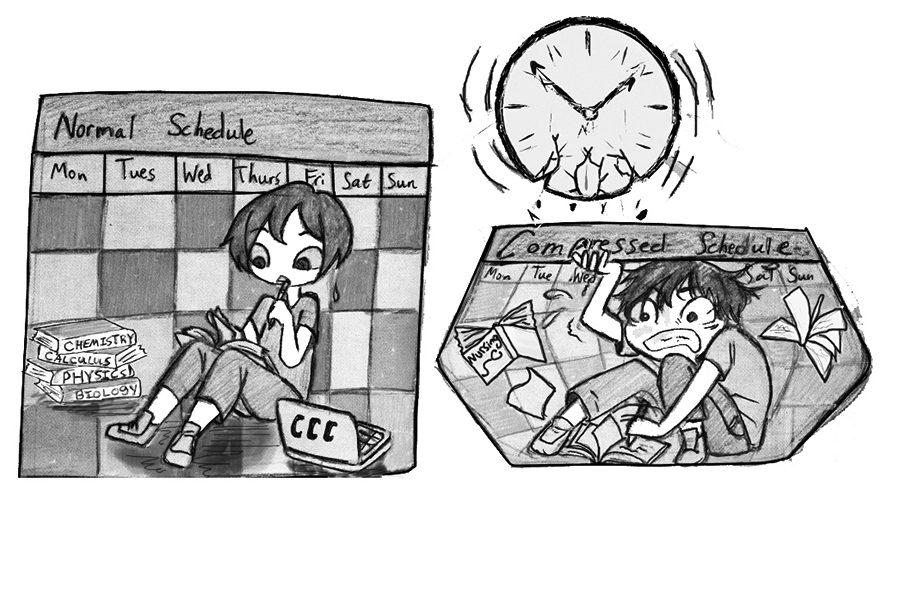Certain change threatens time management
Lesson plans to compress into long lecture classes
May 18, 2016
The possibility of adopting a compressed academic calendar has been a looming issue for Contra Costa College students. The idea is that in response to increasing faculty interest, CCC and other community colleges in the district will shorten the semesters by two weeks.
Studies showing community colleges that employ a 16-week schedule regularly report a 1-2 percent increase in student retention and success are used as justification to support semester compression.
They are considering offering a winter intersession which allows students to take more classes to fast-track their academic studies and allowing the college to make more money.
I believe that although shortening the calendar may have proven to be useful for student success and retention rates in the past, it is important to observe the success of these students independently by subject or major.
What may show up as successful for liberal arts majors may not necessarily stand true for science majors.
Science courses are notorious for being very rigorous and extremely challenging to our wrinkled little brains, therefore the idea that the compression of the calendar is positive for the students with STEM classes is dubious in my eyes.
Taking demanding physics, chemistry and biology classes is challenging. As midterms and finals loom, I would sell earth anytime to be living in planet Mann from the movie “Interstellar,” where days are 67 hours long.
STEM students treasure every minute offered out of class time.
The academic schedule will be altered from an 18-week semester to 16 weeks, of course without the loss of instructional time in the class period.
Class length will be increased to compensate for the compression of the academic calendar.
For example, a 4 unit physics course at CCC has 90 hours of lecture, 36 hours of laboratory. These hours will be unchanged by compressing the calendar.
I think that pushing students to work with the same course load over a shorter time frame misplaces the main objective of community colleges.
They are a foundation for students to learn, not primarily to finish faster and set off into the world.
Yes, a compressed calendar may mean less school time leaving more time to party and go on vacations without worrying about midterms lurking in the closet.
Do we really want to undergo consequences that can be deemed negative for the sake of our luxury?
The National Teaching & Learning Forum journal speaks against the value of long lectures, as demonstrated by research on human attention spans and information retention.
This is largely due to the flow of students’ focus during a normal class period where studies show that student focus reaches a point where it eventually maxes out or they totally zone out.
For me, personally, as a science major I would rather deal with 18 weeks rather than having to endure long lectures either in a classroom setting or elsewhere. I tend to get fidgety and zone out when class time is very long.
These behaviors do not demonstrate bad habits, but are common in classes where only the most hardworking and organized students can endure.
However, I believe the value of a non-compressed calendar doesn’t put an emphasis on student attention spans and retention solely.
I understand that compressing liberal arts classes is uncomplicated, as class periods are almost exclusively lectures.
Science courses, on the other hand, contain labs, which make it tougher to compress.
I don’t mean that liberal arts majors are in some way less important or less valuable than science majors. Science courses just generally contain more information and are demanding in that science majors with these classes will be expected to apply what they learned in an equally demanding workforce.
For example, CCC has an excellent nursing program where well-trained nurses graduate and apply their skills in the real world.
Anatomy or physiology courses that have course material organized for an 18-week semester will be forced to compress the same material into a 16-week semester.
It is fair to say that some material, especially in labs, will possibly have to be removed or incorporated into a compressed schedule.
This fast-paced learning environment consequently takes a toll on student learning behaviors where they get less time to really consume the material and are forced to focus on the grades more than the learning experience.
Is the main concern securing well-informed and competent students or faster-graduated students who may not be as competent due to the rush to finish fast?
The latter is what a compressed academic calendar appears to be doing.


